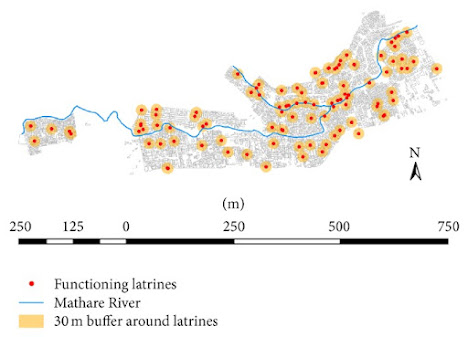Toilets as opportunities?
My last blog will be continuing on the
theme of toilets – offering some hope for the future of toilets in informal
settlements in the global south. The film Slumdog Millionaire perfectly
captured the paradox of slum life – the harsh conditions that people are living
in, but also the potential of entrepreneurialism to generate income. This
paradox is also seen in Mathare, an informal settlement in Nairobi, Kenya (as
shown in Figure 1).
Figure 1: Alleyway in a slum in Mathare, Nairobi
In
Mathare, the toilet is being reinvented – not just on a public health
imperative, but as a business opportunity (‘A toilet is not just a toilet’). At
‘Number 10’ neighbourhood, a shared
toilet (which has a fee to use) is managed by a local youth group, generating income for
themselves as well as other avenues – such as a mobile banking kiosk and water
point, which are next to the toilet. In this way, urban sanitation is linked to
urban economies and infrastructures.
Ikotoilet
(as shown in Figure 2) is a sanitation intervention in Nairobi, providing pay
per use public toilets. They provide a high level of maintenance and
cleanliness, challenging the views around toilets as
being unpleasant places. Also, by providing shoe-shining stations and snack stalls,
extra income is generated to fund the project. Highly successful, in 2008 an
Ikotoilet was installed in Mathare, and by 2010, another 40 toilets had been
built across Nairobi. These interventions turn toilets into ‘little development devices’, as they are reworking
sanitation experiences, and potentially shaping future innovations ‘from the bottom up’.
Figure
2: Ikotoilet block in Nairobi
New
sanitation projects, such as these market-based approaches, are not only provide
vital services but create a positive multiplier effect and help break down
taboos and stigmas around ‘shit’. In this way, they are instrumental in the improvement
of sanitation in low-income settlements. However, they require people in the
community to take on responsibility and an active role in
improving their sanitation, working within the urban constraints.
Over
the last few weeks, I have thoroughly enjoyed learning about water and
sanitation in Africa. It has become clear that Africa is not doomed, even
though there is still so much progress to go, there are glimmers of hope in
providing safe water and sanitation to all. I have also understood that water
and sanitation is a complex issue and not just a technical one, but political,
health and infrastructural, requiring a range of stakeholders to cooperate in
creating safe and equitable access to such services.




Comments
Post a Comment